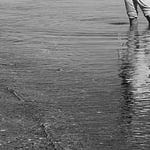Beneath the scenes of holiday brochures
Where paradise is promised, never found
Forgotten souls await behind the doors
Of destiny’s Collector of the Drowned
Above a city’s strangled arteries
Where wealth and opportunity are born
A Watchman tells a Seeker what he sees
Then rests before it’s time to blow the Horn
Across the bridge of reason and routine
A laugh persuades a Mourning Girl to stay
A Con conspires with a doubting Queen
A tired Wanderer pursues the way
They might return when futures form the past
And twilight comes to find them all at lastDon’t worry, I’m not going all heathen on you. But there is something interesting I’d like to point out: The Norse gods had zip codes. (Perhaps “postnummer” would be a more appropriate term.)
The Swedish city of Uppsala was founded by Freyr himself. Big, beautiful Lake Mälaren was itself the trick that Gefjon played on Gylfi. Laesø, voted Denmark’s second most wonderful island, is also the place where some say Thor had his epic scrap with the berserker brides. In a literal sense, much of Scandinavia rests on the shoulders of giants.
Today, we of course find these stories preposterous. Imaginative thinking used as a filler explanations for people who didn’t yet know their Calculus.
You know what I find actually preposterous?
Colts Neck, Florida was so named because the would-be developer had season tickets to the Baltimore Colts. You will find housing projects in Troy, New York on “Project Road” because the developers couldn’t be bothered to think of anything more inspiring. And “Chapel Glen” has never known glen nor chapel—the name was chosen by private equity to look nice on marketing brochures.
The funniest thing about Glengarry Glenn Ross is that the names aren’t even North American. To sell the lie of the promise, Mitch and Murray have to evoke sensibilities from across the pond.
Where do we go to collectively celebrate the spiritual dimension of where we live? We live atop land whose stories we never share. Its plants and animals are not considered a blessing, but rather a wildlife impediment to municipal separate storm sewer systems. The place names suggest intended market value, not reverence or memory.
The Norse grew their culture upon the soil of place and myth—with a vague, fertile frontier of difference between the two. I’m not saying we start maurading on longboats again. But maybe in this particular, we could learn a thing or two.
(As chance would have it,
recently posted about grappling with life directions, and attending to her relationship with the land around her. I’d recommend checking that out as well.)














Share this post